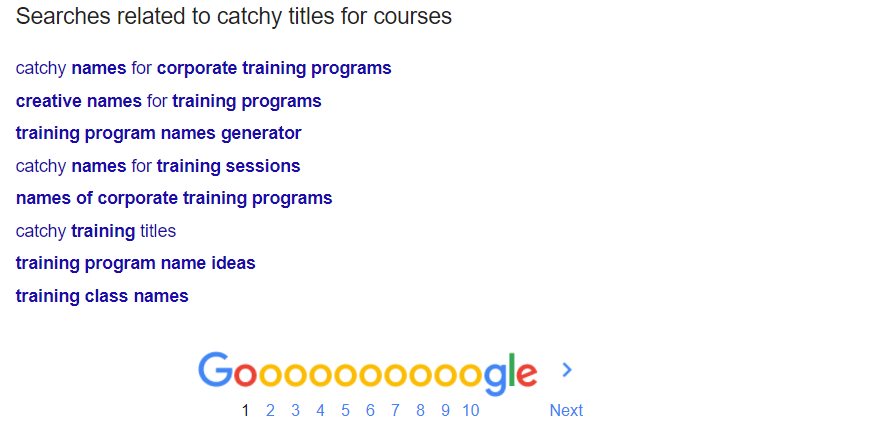Table of Contents
You have put so much effort and passion into creating your online course, and now you are finally ready to start selling it or promoting it to your ideal learners. But have you also thought of the course title?
While you may be fretting about the content, it’s important to think of a title for your course that also reflects what you want learners will take away from each unit. It makes sense that you also want your course to speak to the heart of your potential customers. Regardless of whether it is a free or paid course, you still want it to be compelling for prospective learners to hit the “sign up” button, right?
But, what makes a great name for an online course? Is there a specific SEO strategy you can apply to decide on the best name? What elements should you be mindful of when assessing potential titles? Is there a way to ensure that your online course will appear on the search engine results when your audience searches for the online course topic? Are there keywords you should include that will increase the chances?
This article will be your go-to for everything you need to know about brainstorming great course titles. From what words are best, what makes a good name, and what makes the right name for a course – these tips can help come up with both creative names as well as unique names that are also memorable!
Table of contents
-
- 1The Importance of a Great Course Title
- 210 Tips on How To Write Catchy Names and Titles for eCourses
- 3Formulas for Online Course Titles (+ Examples)
- 4Winning Title Templates That Work
- –Bonus Section: The Importance of Corporate Training Names
- –Get Inspired: Best-Sellers To Craft Awesome Course Titles
- 1The Importance of a Great Course Title
The Importance of a Great Course Title
An enticing and robust headline is perhaps the most essential element of any marketing copy. Writing a good eLearning title might sound easy, but can be quite challenging. The difference between a good and a great course title has a significant impact on your visitors and ultimately your sales.
As such, you will need to make sure that you create a descriptive and interesting title. Giving out enough information and engaging the readers through a short and catchy title is the secret to success.
For example, a catchy online course title can also be an integral part of your online training business giving tangibility to an intangible concept and differentiating your online training from the competition. A catchy training program name can make a difference.
Let’s take the online training business as an example and break down the advantages of a popular training course name:
10 Tips on How To Write Catchy Names and Titles for Online Courses
1Use popular search queries
Search engines know more than the rest of us know about our more intimate thoughts. One of them is how we name our thoughts. Start typing a few ideas in a search engine and wait for the autocomplete to suggest a few search phrases. Google also includes similar results below.

Going a bit deeper, after you collect a list of possible names, variations, and alternative keywords, try getting the search volume from Google Keyword Planner. Use phrases from your title names and see if any have a big enough volume of search or try discovering related keywords based on them.
Check out the following video on how to use the most popular tool for keyword discovery that will help you identify and write an SEO-optimized title for your online course.
Popular search queries such as “how-to” and “what” attract people’s attention. People want something useful, and usually, they search Google to find it!
2Specify your audience
When you’re creating a course, it is important to consider who will buy this product. If your audience isn’t specifically defined in the text of your work then they might be left wondering what exactly am I buying?
Make sure that any language used doesn’t narrow down too much to one specific group; instead, try writing with most age groups in mind by using common sense when determining how to best convey messages while still staying true to tone and style preferences throughout all segments.
For example, if you are a small business in the fitness industry with an online course of a high-powered fitness training program that extends to 4 weeks, addressing people who want to workout to burn fat, then go ahead and spill it out, nice and clear: “The Ultimate 4-Week Bodyweight Workout to Get Fit, Strong and Lean.”
3Focus on the key benefits
We all know that attention spans these days are short. You shouldn’t just state the facts, but weave them into an interesting narrative for your audience! When it comes to setting up the digital marketing strategy for your online course -part of which is the course’s title- don’t be afraid of telling people exactly what they will learn. Grab their attention first and then get them to read the rest of your marketing copy!
4Keep it short and memorable
Make sure your title is easy to remember (so people can tell others or easily share on their social media). While there isn’t a particular size a title has to have, it’s a good idea to keep your most juicy part in the beginning. Keep in mind your students’ goals. They should be reflected in the title.
Also, have in mind that Google keeps about 50-60 characters to display in search results. If you aim for SEO, give your message in the first displayable characters. You can write a bigger more descriptive title or subtitles to carry over your message. Use “:” or “-” to break the main part and add a subtitle.
5Make it accurate
You can get more people interested in your online course if you set the right expectations. Understand what your audience is looking for and use words like “teaching” or “lesson” instead of just saying “course.”
For example, if you run a business education business and your online course is about teaching business skills (e.g. marketing training or sales training) it is important not only to teach your audience how but also why certain things work, and what the learning outcome will be – this will make sure that your learners’ experience is rewarding.
There are some cases that you need to generalize, especially if you are teaching a very broad topic and target a broad demographic, in that case, you might also need to rethink breaking your course into smaller pieces and create a course bundle for the broader topic.
Remember to set clear and attainable expectations. Setting too high expectations you can’t fulfill might backfire.
6Make it look as good as it would sound
Can you hear your thoughts? We translate written language into sound. Your title needs to be just as catchy in tone, with an engaging rhythm that is easy on the ears and gets people talking about what they read! Also, this is a very useful tactic to apply when brainstorming brand name ideas.
Say it out loud a few times so there are no mistakes when reading back later – this will save time down the line since someone else might have trouble understanding where certain words were used or why something sounded off.
7Make your audience a promise
Your audience, like you and everyone else in this world, wants something that is valuable. Your title should embody not only what it takes to get ahead but also why they deserve their reward for investing time into learning how.
Mentioning “your promise” at the beginning of your title helps remind people why signing up for this online course could be worth someone’s while.
8Always write with a context
Is your eLearning course intended for beginners in your field or an expert niche? If you are training juniors to become speakers you might need a title like “Juniors’ training to Public Speaking,” whereas if you are addressing experienced speakers you could create a title like “Expert Speaker Training: Learn to dazzle your audience.”
10Course naming checklist
Before you finalize the course title, make sure it checks these boxes:
The art of title writing is a little more challenging than you think. Fortunately, with these 10 tips under your belt, it will become second nature!
💡 For further reading, HubSpot offers some additional advice on this article.
Formulas for Online Course Titles (+ Examples)
Content Sparks provides some great formulas and examples of writing a great course title.
Since people are easily drawn to things that come in 3’s, you can make your title be in 3 key points as well as easy to remember. Simply choose 3 key elements of your course and see how you can combine them.
Formula
A, B, and C
Examples
If it makes sense for your online course, having two strongly connected or seemingly contradicting arguments can make the trick.
Formula
A and B
Examples
This one is greatly used and it is a good opportunity to get some interesting adjectives there. You simply have to extract the essence of your course and include it in your title.
Formula
The A of B
Examples
You can break down your content into one main thing you can give to your learners along with the great benefit that comes with it.
Formula
[Do something] and [Benefit]
Examples
If your course’s route of action is a how-to guide then this one is for you.
Formula
The/Your [Adjective] Guide to [Doing Something or Getting a Result]
Examples
While this looks like the “Do This to Get That”, you can also use it to underline the transformation learners will go through or the journey they will go on if they enroll in your course.
Formula
[Starting point] to [Benefit]
Examples
Well, anything made easy and simple is an attraction all on its own.
Formula
Examples
People love words like ‘secret’, ‘revealed’, ‘exposed’, ‘truth’, ‘myths’, etc. Make sure you do not over-hype the title with tricks and hacks since it may lead to misleading promises. Avoid promises about sharing something no one’s ever heard before if you cannot fully address those promises. Instead, stick to things that a large portion of your own target audience is unlikely to know about.
Formula
Examples
Winning Title Templates that Work
If you are looking for attention-grabbing course title templates to help you write your own, here is a list of some winning templates to get you started:
Bonus Section: The Importance of Corporate Training Names
Naming new corporate training programs is a bit different than a course. A training program might be in the same format as a course but targets a different audience.
Pitching to a Human Resource or Acquisitions Department for an employee training software or offering professional and career education to individuals is different from offering online courses to everyone. Your training program name should reflect that.

The name should inspire confidence, quality, and prestige. Use verbs and nouns that inspire action or purpose and you are already on the right track.
Here is a list of words to use to super-charge your naming efforts:
Acronyms
Training names can also be long or have difficult jargon words. Consider using acronyms to shorten them and make them catchy. See the following examples (as published in the daily newspaper “Business Standard”):
Use a bigger brand
Many training programs focus on software training or branded training from other bigger companies. Using the names of companies like Microsoft, Adobe or Amazon allows you to borrow some of their recognition.
Adobe allows certified instructors to train companies and individuals on their products’ usage, same as Amazon Web Services and Microsoft. If you are an authorized trainer/instructor to one of them, you should be using their brand name in your training title (if you are licensed to, of course)
Get Inspired: Best-Sellers To Craft Awesome Course Titles
Do you have a great idea for the perfect title? Think beyond what is on your mind and explore all new possibilities. Think outside the box, and you may be able to come up with something witty enough for today’s online standards. Books have a lot in common with online courses. Some people might not realize this, but book titles can be used as keywords and will show up when someone searches for that term or topic on Google Search.
Great titles make best-sellers. Take a look at best-sellers and find a few book titles flaring up your curiosity. Get inspired by them and write your best-selling course 😉
💡 Best Sellers often hold part of their success to their title. Here are some Course title examples based on Amazon’s list of bestsellers:
Visit major bookstores online or best-selling book lists like the New York Times Best Sellers to find more recent catchy titles.
Naming your tile is a challenging process, but also very important. You probably clicked on this article because of its title, without even reading the description, and yet, you are here reading the whole article!
A good title can make a difference while selling a course, but a great one will carry you much further. You can establish a name for your brand, work or training, and who knows, maybe even enable you to become a best-selling trainer.
Further reading you might find interesting:
Rosemary is LearnWorlds’ Content Marketing Manager. She has over 2 decades of experience in omnichannel marketing and content writing for the IT and SaaS industry. Her expertise lies in crafting effective content marketing strategies that attract, engage, and nurture customers, enabling LearnWorlds to reach its target audiences with precision.
Kyriaki is a Content Creator for the LearnWorlds team writing about marketing and e-learning, helping course creators on their journey to create, market, and sell their online courses. Equipped with a degree in Career Guidance, she has a strong background in education management and career success. In her free time, she gets crafty and musical.



